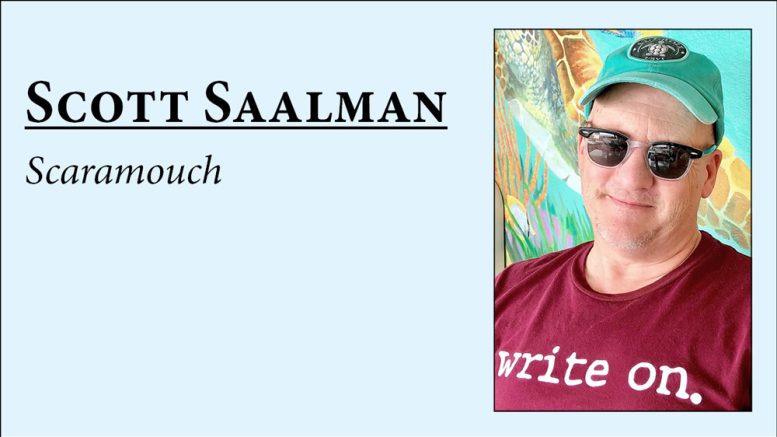INTRODUCTION V.O.: Ineptitude … Failure … Inanity … Stupidity … Murder … Murder … Murder! This is How I Broke This.
SFX: CARTOONISH BROKEN SPRING.
GUY RAZZ: I’m Guy Razz, host of How I Broke This. Not to be confused with that other podcast by that other guy, Guy Raz, called How I Built This. Welcome to my narrative journey about business ineptitude and the failed leaders who failed to learn from their failures. Listen as my guests reveal what led to their crushed entrepreneurial spirits – and hopefully, they’ll reference a murder or two to boost my dismal ratings.
V.O.: Murder … Murder … Murder!
GUY: In this episode I talk with William Tell of failed Rock Hard Pretzel Company in Rock Hard, Indiana. Welcome, Mr. Tell.
WILLIAM: Thanks, Guy. It’s an honor to be talking to you … I guess … or a dishonor, considering the purpose of your podcast.
GUY: The pleasure’s all mine.
WILLIAM: My loss; your gain; I get it.
GUY: Mr. Tell, tell listeners about your family business.
WILLIAM: Our pretzel company was the town’s very first employer. In 1858, pretzel mining was billed as the next gold rush. Settlers came to Rock Hard to work in our pretzel mines. Our first contracts were military.
GUY: The military? Makes sense. Pretzels represent the perfect ready-to-eat meal for soldiers. I get it.
WILLIAM: Guy, our pretzels weren’t MREs. Actually, they were originally purchased as weapons.
GUY: The original Rock Hard pretzels weren’t snack food?
WILLIAM: Have you tried to bite a Rock Hard?
GUY: Real jaw breakers, huh?
WILLIAM: That’s putting it mildly. More like face breakers. Southern Indiana pretzel deposits, due to intense geologic processes, represent the densest material mined from Earth’s crust. The military was so impressed with the rigidity and durability of our product that, during the Civil War, pretzels represented the highest percentage of its arsenal. Forget musket balls! Not only were pretzels used for offensive maneuvers, but they also represented a primitive form of missile defense system, shattering approaching cannonballs in midair.
GUY: Were there pretzel guns?
WILLIAM: No guns, Guy. Slingshots. When Fort Sumter fell, we began mining pretzels 24 hours a day, seven days a week. Pardon the pretzel pun, but my ancestors were soon rolling in the dough. We were honored by the President for helping the Union win. World War I was a great boon for the Rock Hard Pretzel Company, too.
GUY: Your pretzels killed and maimed a lot of people. Excellent! Killings are good for podcast ratings.
WILLIAM: Unfortunately, The War To End All Wars ended too quickly due to the effectiveness of our pretzels. Enemy surrendering was swifter than planned. We banked on a longer war. We became a victim of our own success. Our mass mining surpassed pretzel demand. Onsite inventory crippled our bottom line.
GUY: So, business was touch-and-go until Pearl Harbor?
WILLIAM: We braced for another war-fueled boon, Guy. Early on, that Oppenheimer fella even visited us, interested in designing the perfect pretzel to drop and end the war, but the devastating results of crunch tests at Los Alamos made Oppenheimer go pale. “I cannot be part of such monstrosity on mankind,” he said. “I actually feel guilty wiping out all that cacti.” He was OK with the harnessing of atomic energy though – less death and destruction, but just enough to kind of make a point. The Hague Conventions regarding humane use of weaponry was modified to outlaw pretzel warfare, thanks to Oppenheimer’s reluctance. We were stuck with enough pretzels to last five world wars.
GUY: I guess you were caught between a Rock Hard pretzel and a hard place.
WILLIAM: Grandpa Tell knew we needed to change with the times. Snack foods were rising in popularity after WWII, and he was always intrigued by the popularity of pretzels being served as edibles in Germany. Unfortunately for us, Bavarian mines produced a much softer pretzel that still came with a satisfying crunch. He experimented. No matter how many times it was dunked into his beer stein, the Rock Hard pretzel never softened. Knowing that salt could melt snails and slugs, R&D sprinkled salt on the pretzels. It didn’t make our pretzels any easier to chew, but taste tests revealed that local consumers would put anything in their mouths that had an abundance of salt.
GUY: If you salt it, they will come.
WILLIAM: Food Marketing 101. Local business boomed. Residents exhibited great community pride in knowing that Rock Hard, Indiana, was built on our pretzels, so our product flew off grocery store shelves. Dentists loved us, too. We had the highest dentist count per capita in the U.S. Nine out of 10 dentists recommended our product to patients.
GUY: As a company town, you had a captive audience. Why did the company fail?
WILLIAM (holds up a magazine): This 1955 cover of LIFE says it all. Read the headline for listeners, Guy.
GUY: Rock Hard, Indiana. The Town With No Teeth.
WILLIAM: Rock Hard, Indiana became the butt of Ed Sullivan jokes. Our pretzels broke so many teeth that dentists ran out of patients and uprooted. People stopped buying pretzels. The duration of community pride is only as long as community tooth count. Peace is hell, Guy.
Contact: scottsaalman@gmail.com

